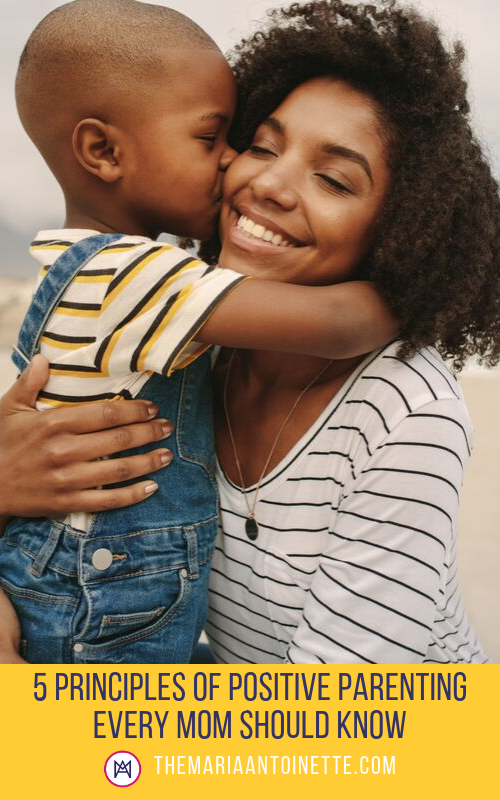Parenting is tough, to say the least, and with the idea of being that ‘perfect’ parent floating around everywhere, a lot of us end up setting unrealistic standards for ourselves and our children, which usually ends badly with burnouts and breakdowns. So here’s a little advice to all the moms out there – stop trying to be the perfect mom. Instead, try to be a positive parent.
So what is positive parenting? It’s a method of parenting that focuses on positive behavior. Don’t mistake this to mean that you should let your child run around doing whatever they want without consequence. It simply means that you’re helping your child understand their developing emotions in a tone that’s calming and comforting, as opposed to yelling or other drastic measures.
To help you get started here are five basic principles of positive parenting I think every mom should know.
Respect
One of the most important principles of positive parenting is respect, and sadly, it is often the most misunderstood concepts too. More often than not, parents forget that respect is a two-way street. We expect our children to be respectful towards us and other adults in general, but we don’t return it to them. Remind yourself that every child is unique, and deserves to be appreciated, respected and treated right to grow up into a positive human being.
What are some ways that you can show respect towards your children?
Listen to your child. When you take the time to listen to your child without interruption you’ll notice how more open they’ll become. It shows them that you genuinely care and are interested in what they’re saying and that their opinions matter to you.
Letting your child make choices about their bodies. I cannot tell you how many times as a child I was told to hug someone who I didn’t want to. It made me feel uncomfortable and if I showed reluctance I was made to feel guilty. This is wrong. If your child does not want to hug someone then they shouldn’t be made to. It’s no different than you as an adult not wanting people in your personal space. The same goes for your child. Be considerate of their personal space.
Don’t come down hard on their mistakes. Children are learning things every day so if they don’t get something right away don’t come down hard on them. Constantly doing so can lead them to develop insecurities and fear that you will be mad at them if they don’t get it right the first time every time. Let them know it’s okay to make mistakes and you’re there for them if they need help.
Allow your child to do things on their own. As parents, when we see our children struggling our first instinct is to jump in and save them. Stop. Let your child figure things out on their own and only lend assistance if they’re really struggling or if they’ve asked for it. This gives your children confidence in knowing that you have faith in them to do things on their own.
Positive Expectations
Setting positive expectations for your child can really help bring out the best in them, and that’s one principle of positive parenting that every mom should definitely know. Set moderately challenging tasks for your child, encourage and push them to work towards it, and applaud him when they do it – regardless of the outcome and success of the task. Having a positive and goal-oriented atmosphere in your household will let your child know they’re capable of doing anything and you’re proud of them no matter what.
Empathy
Being empathetic is another crucial trait for positive parenting, and that means tackling tantrums and meltdowns smartly. It also means that when your child is angry or upset, you need to understand and look at things from their point of view, and read into their needs. Instead of looking at your little one as the defiant one, treat him as your own part, and try to bond with him intuitively. As a parent, try to understand your child’s needs and emotions before judging them. Interact with your child in a way that makes them feel understood. When you do that, it’ll help them develop those qualities themselves.
Discipline
Discipline is a part of every child’s upbringing, but it doesn’t always have to be enforced in a negative way. Remind yourself that discipline and punishment are not alike, and when you’re practicing positive parenting, you might have to set punishments aside. Set rules in your household, but only for things that really matter, and offer your child the freedom of choice (and opinion) in other trivial matters. When things go wrong, avoid resorting to yelling and being negative. Instead, sit down together and look for ways to work around it and make better choices.
Love
Contrary to the popular belief, there is actually nothing wrong with spoiling your child with love and affection. In fact, it is absolutely necessary and a crucial part of your child’s growth and development. Keep in mind, however, that love doesn’t have to be material possessions or gifts. Love is about cuddles, reading together, favorite meals together, and just being present. Sure, we all live hectic lives which makes finding the time to ‘be there’ for your little one sometimes more difficult than you’d like, but if you make it a priority, you can actually make it work.
For more information check out Positive Parenting: An Essential Guide (The Positive Parent Series)
by Rebecca Eanes. It’s a great book on how you can create peace and harmony within your home using this form of parenting. Remember, when a child grows up in a home where they’re loved and valued, it’ll have a lasting influence on them, that they’ll carry into adulthood.
What are your thoughts on positive parenting? Do you have any tips of your own that work for your family? Share in the comments below.
Latest posts by Maria Antoinette (see all)
- 10 Romantic Date Night Ideas For Any Time of The Year - January 26, 2023
- Tips To Help You Reconnect With What Brings You Joy - January 19, 2023
- Planning A Road Trip? Here Are Some Key Tips You Should Know - January 12, 2023






